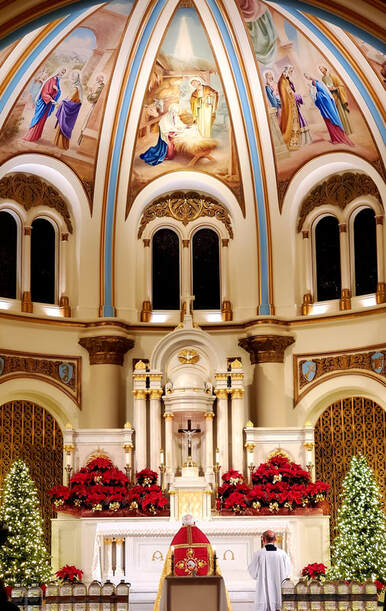Today’s feast of “Epiphany” is a Greek word, two words, actually: “epi” and “phaineo,” meaning a “shining upon.” The star shone upon Israel, leading the three kings over mountain ranges and through river valleys to Bethlehem. It shone upon a simple dwelling, and upon a child. Have you noticed that we’ve fixed the “nativity light” high above the altar? It points directly at the tiny baby Jesus in the manger scene painting, the third of the five joyful mystery frescos in our apse. A light shines in the darkness, and the darkness will never overcome it, but only those who study the heavens will notice it. The three kings studied the heavens, seeking to discover the true essence of things, searching for a light beyond human wisdom. And so a great light was revealed to their minds, which is what “epiphany” means: the veil between heaven and earth was lifted, and the fundamental order of the universe became clear to them. It was the love of a child for his mother, of God for his creatures. Heaven guides earth, and heaven is a little child, who is Christ the Lord.
Herod wants to be a star
King Herod also saw that star, but what did it mean to him? Nothing. He didn’t grasp its meaning because poor Herod was trapped in himself. He considered himself a rising star in the Roman Empire, becoming governor of Galilee at age 25. To consolidate his position he banished his first wife and their son, sent hundreds of priests to their deaths, and finally murdered his second wife and their children. And of course he killed all the baby boys in Bethlehem in a fanatical attempt to maintain control. He spent his life seeking to be a star rather than to follow a star, leaving a trail of blood, destruction, and anguish in the wake of his pitiful life.
Wise Men look up not down
Herod looked down, at himself, but the Wise Men looked up, into the heavens. They recognized the traces of God in all of creation, while Herod recognized nothing of God in himself or in this world, a stranger to himself and a monster to others.
There’s only two ways to go in this life: up or down. I can be a Herod, or I can be a Wise Man. I can choose to complain, to rant, and to despair, or I can choose to thank God, to edify, and to rejoice in the life God has given me. This joy is not just the power of positive thinking; it is “a cry of recognition and of love,” as St. Therese wrote: “to me, prayer is a surge of the heart, a cry of recognition and love.” All of us, in this new year, are concerned about our nation, about our Church, and about our personal lives. Try not to worry. Try to look up, not down. Everything in the Scriptures today urges us to look up: “Rise up in splendor, Jerusalem! Your light has come … Raise your eyes and look about, and you shall be radiant at what you see.” A young professional, who recently moved to San Francisco, the shining city on the bay, asked me before the last Mass: “what will happen to us this year?” I was inspired to reply that I knew what will happen this year: God’s grace will prevail over every darkness and disorder. Has 2020 left you downcast? Then look up, after the shining example of Balthasar, Melchior, and Gaspar, our three Kings.
A People of Praise
No one wants to be a Herod, not even Herod. No one wants to kill babies, or their own wife and sons, and live in fear. But unless we study the heavens like the Magi, we will sink with him into chaos. Take the trouble to pray, to look up instead of down, to seek and expect joy. Take the time to stop in the church for a quiet prayer, or gaze through an open window at the horizon, or look into the eyes of someone who lives with you. Training our eyes on the things of God will grant us keen intelligence, unshakeable peace, and enduring joy. A blessed and happy New Year to you all!



 RSS Feed
RSS Feed